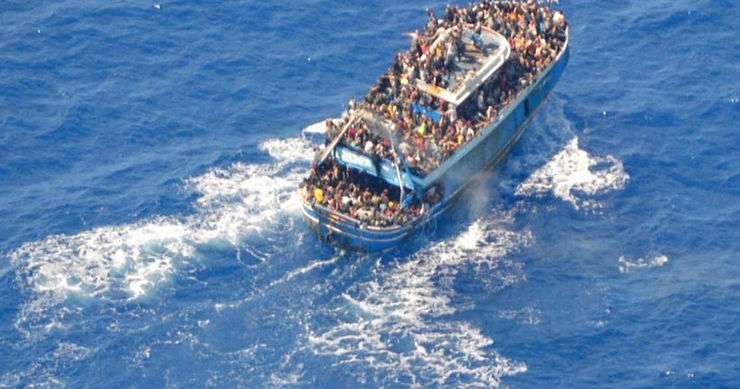By: Ariana Cao
The news of the blue trawler’s capsize was reported on the morning of June 14, making the Mediterranean become a stage for tragedy. Just 104 people survived this shipwreck that took place between Libya and Greece. The migrants had no choice but to get on the boat that was doomed to sink.
On June 8,750 migrants came on board a rickety blue fishing trawler that eventually sank in the Mediterranean. The migrants came from different places and for different reasons, such as escaping from wars or earning money as the breadwinner of the family. Some of them were even children.
For Syrian refugee Thaer al-Rahal, it was because of the leukemia diagnosis of his 4-year-old son. “Thaer thought he didn’t have a choice,” as his cousin said. For Pakistani Matloob Hussain, it was because of the extremely heavy burden he bore for his family, since “his salary helped put food on the table for 20 extended family members amid a crippling economic crisis”. Most of the people who boarded this ship were under similar desperate circumstances.
The time spent waiting for boarding in Libya was hard, and the poor conditions and tense atmosphere added to the anxiety of the migrants gradually, darkening their moods. According to one survivor, the house there had “a big yard and big walls and people at the door with guns”. Although they were worried, they tried to keep their hopes up. Bilal Hassan, a 24-year-old Pakistani migrant, was smiling in the video he sent back to his family and tried to cheer people up by reciting Punjabi poetry.
Finally, on June 8, Matloob Hussein called his brother from the trawler and conveyed that the boat was very bad, though he didn’t refuse to get in since the smugglers had guns and knives. It was the last thing they heard from Matloob before the ship sailed. Although his brother felt suspicious of the trip, he still could not stop Matloob from embarking on the fatal journey.
On June 14, after the news of the capsize, relatives of the survivors waited outside the reception center, and others waited in their hometowns plugging their phones on the charges so as not to miss any important calls. The mother of 23-year-old Amr Elsayed described missing her son so much that she felt as if she were burning.
After the accident, interviews were taken with the relatives of the victims, many of whom expressed surprise, disagreement, and regrets towards their failure of stopping the victims from going on the dying trip, as Rahal’s family said they do not know how he contacted the smugglers in Libya.
Link to article: https://eb18600f7bb2916037f5ee8e636ce199.cdn.bubble.io/f1687707239039x781447615300021100/How 750 migrants ended up on the boat that capsized near Greece – The Washington Post.pdf











